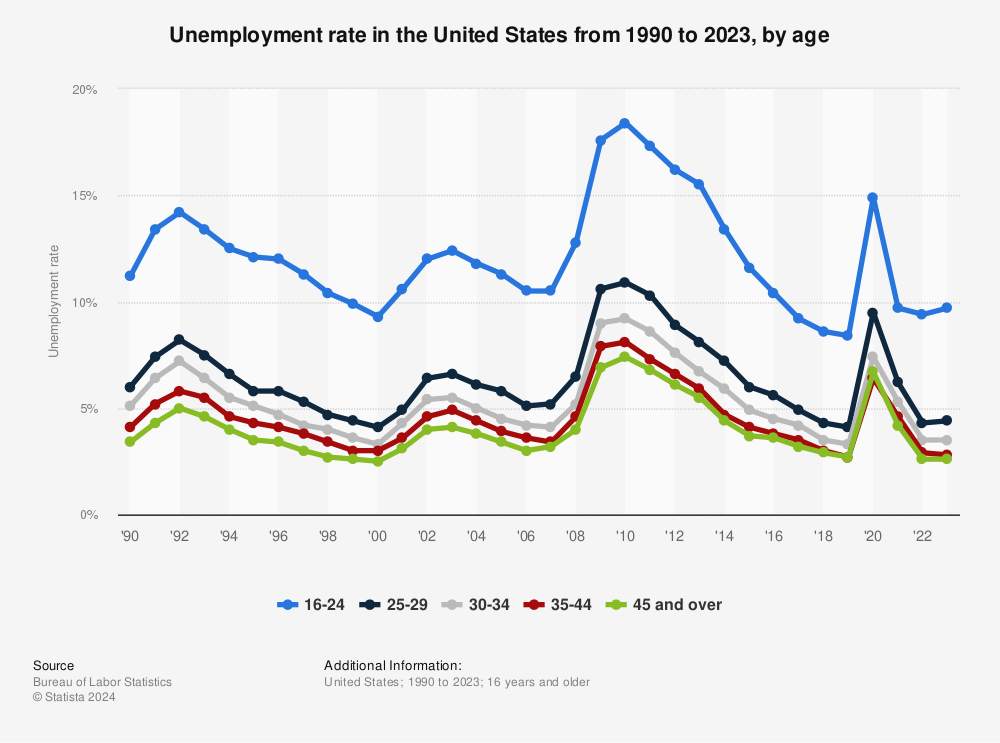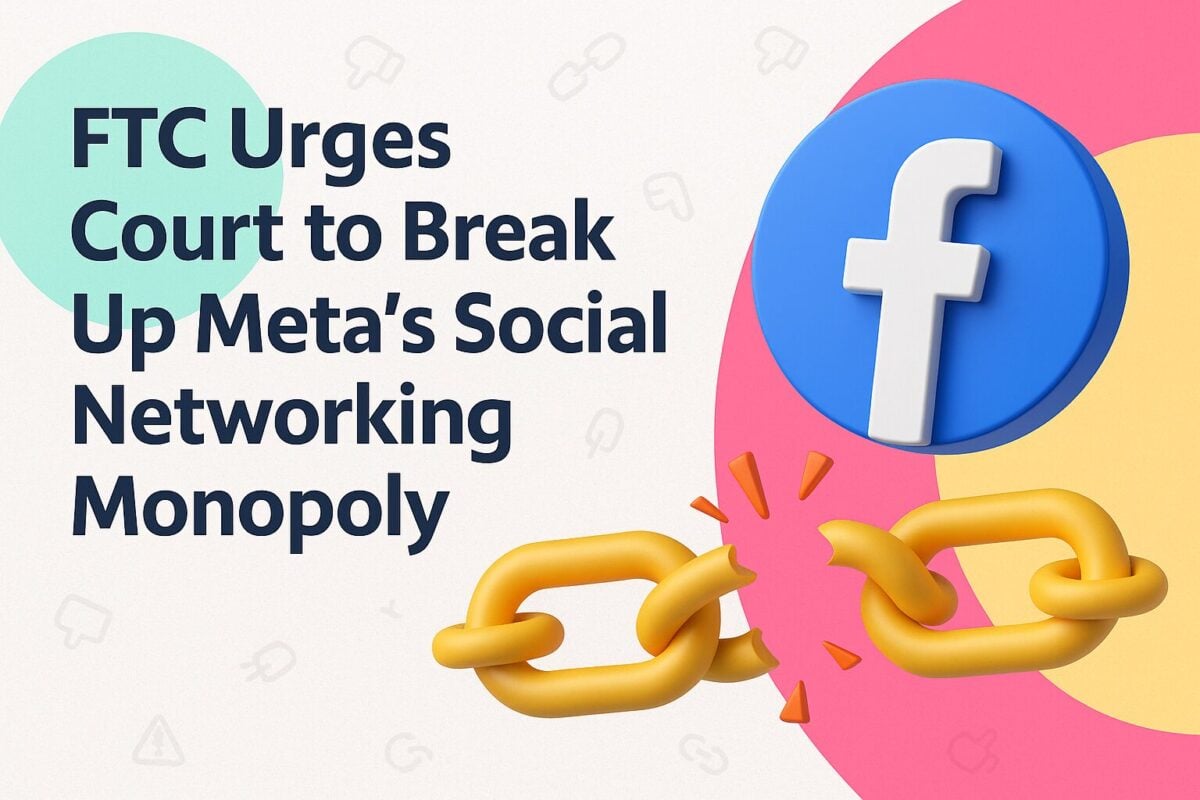The influence that Millennials have on the retail market is growing, which explains why their shopping trends and spending behavior are the focus of so many research campaigns.
There are clear differences in their spending habits compared to previous generations. While they’re more inclined to shop online, dining out remains one of their biggest monthly expenditures.
Despite their reputation for being glued to their screens, Millennials still value in-person socialization. Additionally, they prioritize social responsibility over price, and saving money is important to them.
Personalization also plays a crucial role in their shopping experience, with 88% preferring personalized advertising. We've gathered 20 key statistics that offer a comprehensive look at their spending habits over the past year.
- 1. There Are Over 70 Million Millennials in the US
- 2. More Than 90% Are Employed
- 3. Millennials’ Spending Power Is $2.5 Trillion
- 4. Millennials Spending More in 2023 Compared to 2024
- 5. About a Third Uses Buy Now, Pay Later
- 6. Saving Is Actually a Priority
- 7. Increasingly More Millennials Choose to Live With Their Parents
- 8. Millenials Biggest Expense in 2024
- 9. Self-care Drives Their Spending Habits
- 10. Societal Impact Matters
- 11. Gaming Is Important to Them
- 12. PlayStation Is a Favorite Brand
- 13. Home Furnishings Are a Big Priority in 2024
- 14. Nearly 49% Plan to Spend Less on Pet Supplies
- 15. 15% of Millennials Plan to Spend More on Streaming Services
- 16. Online Shopping Is the Most Common Among Them
- 17. Amazon Is a Firm Favorite
- 18. Only 15% Plan to Buy Goods In-store This Black Friday
- 19. North American Millennials Expected to Spend the Most This Holiday
- 20. British Millennials Spend About £30 Per Person
- Wrapping Things Up
- Frequently Asked Questions
1. There Are Over 70 Million Millennials in the US
According to data shared by Statista, in 2020, there were 72.19 million millennials in the United States. It works out to nearly 22% of the US population. In short, millennials are regarded as anyone born between 1981 and 1996.
In 2020 the global population of millennials is approximately 1.8 billion with the population spread across various regions.
Till recently, baby boomers (those born between 1946 and 1964) were the largest generation group. Though, in the past decade, their numbers have decreased by almost 6 million.
2. More Than 90% Are Employed
The unemployment rate for people ages 25 to 34 in 2020 in the United States was lower than 10%. If you break it down further, it was the highest (9.5%) for people ages 25 to 29, while for people ages 30 to 34 it was 7.4%.
On a side note, though, it declined steadily for the past decade and in 2019 it was the lowest that it’s been since the turn of the millennium, but in 2020 the levels more than doubled for both these two age groups. Much of this can be attributed to the COVID-19 pandemic.
3. Millennials’ Spending Power Is $2.5 Trillion

Millennials spending power
4. Millennials Spending More in 2023 Compared to 2024
Specific comparison data between 2023 and 2024 spending is not available, but overall millennial spending continues to rise due to increasing costs of living and lifestyle choices.
5. About a Third Uses Buy Now, Pay Later
According to data shared by Statista, more or less 30.3% of millennial digital buyers were expected to use the Buy Now, Pay Later (BNPL) option in the US in 2021. On the other hand, nearly 37% of Gen Z digital buyers were anticipated to use this payment method for the same period.
It’s expected that during the next two years the use of BNPL will steadily increase. Then, after 2023, it will continue to increase, but at a much slower rate.
6. Saving Is Actually a Priority
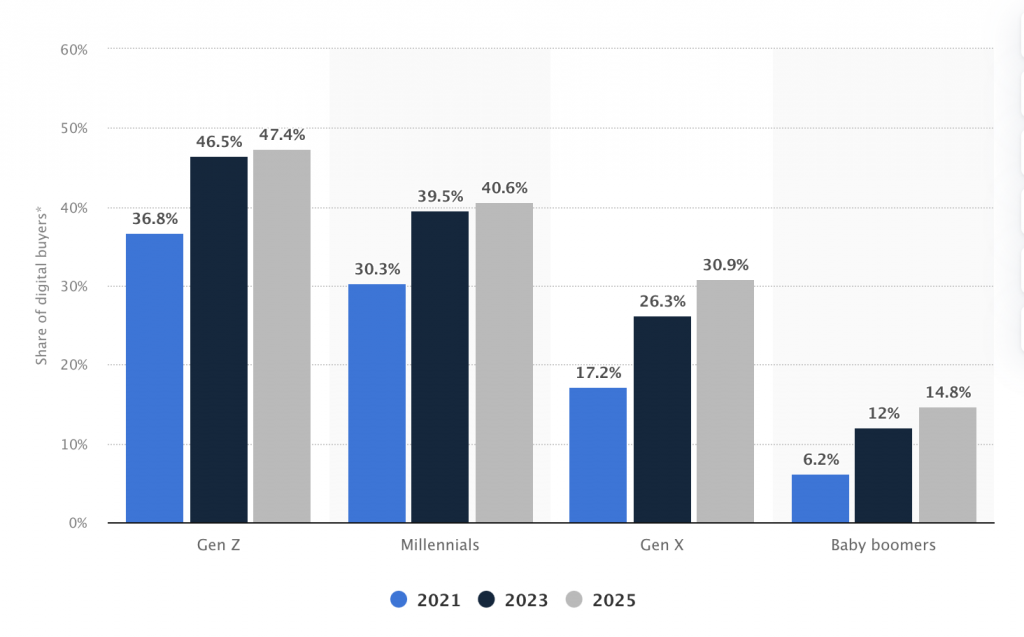
Source: statista.com
Before we look at how and on what they typically spend their money, there’s one misconception that needs to be cleared – millennials actually prioritize saving money. While saving is important, many millennials struggle with it due to high living costs and debt, although 64% are investing in some form.
7. Increasingly More Millennials Choose to Live With Their Parents

Source: about.bankofamerica.com
For the past five years, the number of millennials ages 25 to 34 who live with their parents in the United States have increased. All in all, men are more inclined to live with their parents with almost a quarter (22%) of men in this age group indicating that they still lived with their parents. On the other hand, only 13.4% of women in this age group stated that they lived with their parents.
8. Millenials Biggest Expense in 2024
In 2024, the biggest expense for millennials is housing. This includes rent, mortgage payments, property taxes, and home maintenance costs. Approximately 33% of millennials spend up to 26% of their income on mortgage payments, which is more than any other generation. Additionally, millennials are known to have paid significantly more on rent compared to Baby Boomers, highlighting the financial burden that housing represents for this generation
9. Self-care Drives Their Spending Habits
In 2024, millennials continue to prioritize self-care, which significantly influences their spending habits. They are investing more in wellness products and services than previous generations, particularly focusing on mental and physical well-being. This includes spending on beauty products, fitness memberships, and mental health resources such as therapy sessions and mindfulness apps. The emphasis on self-care is a reflection of their broader concern for maintaining a balanced and healthy lifestyle, which has become a core part of their consumer behavior.
10. Societal Impact Matters
Millennials might be guilty of a little self-indulgence, but that doesn’t mean that the welfare of others are ignored. 83% of millennials prefer supporting brands that align with their values, particularly those focused on sustainability
All in all, millennial consumers are more concerned about ethical implications than price.
11. Gaming Is Important to Them
In 2024, gaming remains highly important to millennials, with this generation representing the largest segment of the adult gaming population. Millennials are deeply engaged in gaming across multiple platforms, including PC, console, and mobile. According to recent reports, over 80% of millennials who are aware of esports have engaged with the content, and 61% have participated in livestreaming. This generation's strong connection to gaming is reflected not only in the hours spent playing but also in their involvement in the broader gaming culture, including social media interactions and participation in gaming-related events.
12. PlayStation Is a Favorite Brand
Considering that gaming is a major driving force, it should come as no surprise that more than half of millennials have an emotional connection with PlayStation and it scored the highest for nostalgia, according to data shared by MarketWatch. Other brands that have made their top 10 are Amazon, Disney, Target, YouTube, Jeep, Ford, and Apple.
The study also revealed that men tend to prefer gaming brands, while women prefer retail brands. All in all, online data reveals that millennials are the most brand-driven. Almost a third confessed that they’re always on the lookout for brand names when shopping online.
13. Home Furnishings Are a Big Priority in 2024
Home furnishings are a significant priority for millennials, reflecting their focus on enhancing their living spaces as they spend more time at home. According to recent reports, 36% of millennials plan to purchase indoor furniture, and 33% are focusing on home décor and pillows. Additionally, outdoor furniture and renovation supplies are also high on their list, with 25% indicating an intention to invest in these areas. This trend is driven by millennials' desire to create comfortable and functional living environments, particularly as many continue to work remotely and prioritize home-centered lifestyles.
14. Nearly 49% Plan to Spend Less on Pet Supplies
49% of millennials plan to spend less on pet supplies. This shift is primarily driven by economic factors, such as rising costs and inflation, which have caused many to reconsider their spending habits on non-essential items for their pets.
Additionally, 37% of millennials also intend to cut back on pet food expenditures as they seek to manage their budgets more effectively during these financially challenging times
15. 15% of Millennials Plan to Spend More on Streaming Services
Approximately 15% of millennials plan to increase their spending on streaming services. This indicates that while some millennials are looking to cut costs by switching to lower-cost or ad-supported versions of services, a significant portion is still willing to invest more in their streaming experiences, reflecting the continued importance of digital entertainment in their lives.
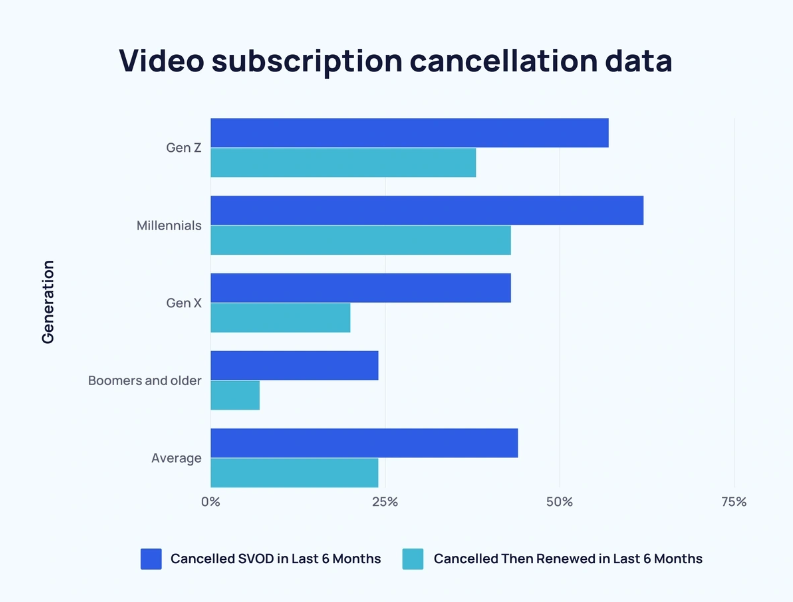
16. Online Shopping Is the Most Common Among Them
Online shopping is indeed the most common shopping method for millennials in 2024. Approximately 73% of millennials prefer to shop using their phones, making mobile shopping their primary method.
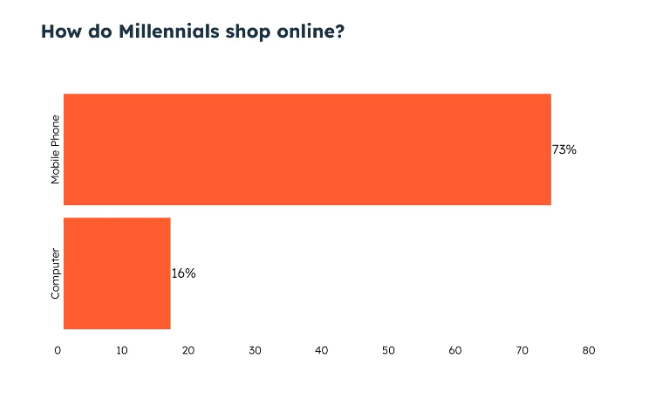
Additionally, 38% of millennials prefer to shop online rather than in-store, and 32% do most of their shopping online. This indicates a strong preference for online shopping among millennials, particularly via mobile devices
17. Amazon Is a Firm Favorite
Amazon remains the most favored eCommerce site among millennials. It leads as the top platform where millennials begin their shopping process and is the most popular online retailer for this generation.
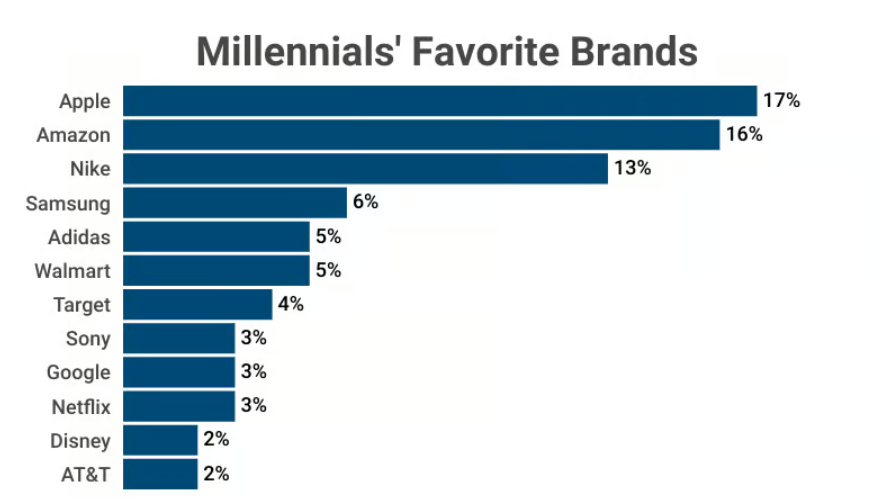
Amazon's dominance in the eCommerce space is due to its wide range of products, efficient delivery services, and strong brand trust among consumers. Additionally, Amazon is not only the starting point for many online shopping journeys but also the preferred platform for frequent purchases among millennials.
18. Only 15% Plan to Buy Goods In-store This Black Friday
A survey that researched the shopping behavior of UK consumers regarding Black Friday and Cyber Monday found that only 15% of millennials planned to buy in-store. This is more or less the same for Generation Z with 16% indicating that they’ll rather go to a brick-and-mortar store.
When comparing the preferences of men versus women, there’s no real difference. Only 2% more men indicated that they would prefer to visit a physical store.
On the other hand, millennials in Spain and France were more likely to shop at physical stores. About 28% of Spanish and 24% of French millennials stated that they planned to shop in-store on or around Black Friday.
Whether they plan to shop online or in-store, compared to older generations, UK millennials were actually not planning to spend a lot of money on Black Friday. According to a survey, baby boomers and Generation X are expected to be the biggest spenders in 2021 and are planning to spend about £310 and £339 respectively.
19. North American Millennials Expected to Spend the Most This Holiday
Over in the US and Canada, it’s anticipated that millennials will spend the most this holiday season. According to data shared by Statista, the average Canadian millennial will spend about 1,600 Canadian dollars during 2021’s holiday period, while the average US millennial will spend about 1,646 US dollars on average.
On an interesting side note, it’s not only drunk-dialling that’s a thing. Millennials spent on average 475 US dollars when shopping while intoxicated in 2020. They spent only $45 dollars less than Generation X consumers who were the top spenders when intoxicated. Though, they might not be the biggest spenders, but it’s more common behavior for them. A survey completed in September 2020 revealed that more or less a third of millennial consumers have made at least one purchase while they were intoxicated in the past year. Most of the time, they spent their money on food, followed by clothing and cigarettes.
20. British Millennials Spend About £30 Per Person
Another holiday during which millennials spend more than other consumers is Easter. According to data shared by Statista, millennials and Generation Z spent the most. On average, they planned to spend about £30 per person in 2021. To put this in perspective, other generations were planning to spend about only£20.
Wrapping Things Up
With over 90% of US millennials employed, there's a very good reason why their buying habits have come under the spotlight. Not only do they have the buying power, but their opinions also matter considering that almost a fifth of them occupy managerial roles.
All things considered, there are a few key things that stand out that marketers can put to good use. Food and personal care products are some of the things that they love to spend money on. Also, while their loyalty to brands is remarkable, increasingly more millennials are concerned about the social responsibility of their purchase decisions. Oh, and if you can throw in anything gaming-related, you’re sure to get and hold their attention.
Frequently Asked Questions
What are the key spending habits of millennials?
Millennials prioritize experiences over material goods, with significant spending on dining out, travel, and self-care products. Despite their preference for online shopping, they also value in-person socialization. Social responsibility plays a crucial role in their purchase decisions, often influencing them to support brands that align with their values. Additionally, they focus on saving, although rising living costs and debt can make this challenging.
How do millennials compare to previous generations in terms of spending?
Millennials differ from previous generations, such as Baby Boomers, in several key ways. They are more likely to shop online, prioritize experiences over possessions, and value social responsibility in their spending choices. While Baby Boomers focused on homeownership and long-term savings, millennials are more inclined to invest in travel, technology, and self-care, reflecting their preference for a balanced lifestyle.
Why do millennials prefer personalized advertising?
Millennials favor personalized advertising because it resonates with their individual preferences and lifestyle choices. About 88% of millennials prefer ads tailored to their interests, as they feel these ads are more relevant and less intrusive. Personalized marketing enhances their shopping experience, making it more convenient and aligned with their values, which in turn increases brand loyalty and purchase intent.
How does social responsibility influence millennial spending habits?
Social responsibility significantly impacts millennial spending habits, with 83% preferring to support brands that align with their ethical values, particularly in sustainability. Millennials are willing to pay a premium for products and services from companies that demonstrate environmental stewardship and social good, even if it means spending more. This trend reflects their desire to make a positive impact through their purchasing power.
What role does online shopping play in millennial spending behavior?
Online shopping is a cornerstone of millennial spending behavior, with 73% preferring to shop via mobile devices. Millennials appreciate the convenience, variety, and speed offered by online platforms, making it their primary shopping method. This shift has led to the dominance of eCommerce giants like Amazon, where millennials frequently start their shopping journeys, influenced by the seamless experience and broad product selection.
